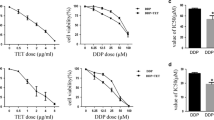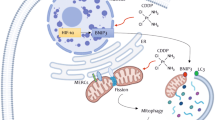Abstract
Cisplatin-based chemotherapy frequently resulted in acquired resistance of cancer cells. The underlying mechanism of such resistance is not fully understood especially the involvement of autophagy and autophagic cell death. This study thus investigated whether an alteration in autophagy could be responsible for cisplatin resistance in the long-term exposure lung carcinoma cells. The cisplatin resistant clone (H460/cis) of H460 cells was established by exposing the cells with gradually increasing concentrations of cisplatin until chemoresistance acquisition was elucidated by MTT, Hoechst 33342 staining and comet assays. Degree of autophagosome formation and level of LC3 marker were evaluated by acridine orange and western blot analysis, respectively. H460/cis cells exhibited irregular shape with ~3-fold resistant to cisplatin-induced apoptosis compared with H460 cells. Proteins analysis for LC3 indicated that the levels of LC3 in resistant cells were significantly lower than those in H460 cells. Moreover, autophagosome formation detected by acridine orange staining was dramatically reduced in the resistant cells, suggesting the role of autophagy in attenuating of cisplatin-induced cell death. Further, co-treatment of cisplatin with autophagy inducer, trifluorperazine, could resensitize H460/cis cells to cisplatin-induced cell death. Our findings reveal the novel mechanisms causing cisplatin resistance in lung carcinoma cells after long-term drug exposure regarding autophagy.





Similar content being viewed by others
References
Edinger AL, Thompson CB (2003) Defective autophagy leads to cancer. Cancer Cell 4:422–424
Gozuacik D, Kimchi A (2004) Autophagy as a cell death and tumor suppressor mechanism. Oncogene 23:2891–2906
Levine B, Klionsky DJ (2004) Development by self-digestion: molecular mechanisms and biological functions of autophagy. Dev Cell 6:463–477
Opipari AW, Tan L, Boitano AE, Sorenson AR, Aurora A, Liu JR (2004) Resveratrol-induced autophagocytosis in ovarian cancer cells. Cancer Res 64:696–703
Kondo Y, Kanzawa T, Sawaya R, Kondo S (2005) The role of autophagy in cancer development and response to therapy. Nat Rev Cancer 5:726–734
Degenhardt K, Mathew R, Beaudoin B, Bray K, Anderson D, Chen G, Mukherjee C, Shi Y, Gélinas C, Fan Y, Nelson DA, Jin S, White E (2006) Autophagy promotes tumor cell survival and restricts necrosis, inflammation, and tumorigenesis. Cancer Cell 10:51–64
Katayama M, Kawaguchi T, Berger MS, Pieper RO (2007) DNA damaging agent-induced autophagy produces a cytoprotective adenosine triphosphate surge in malignant glioma cells. Cell Death Differ 14:548–558
Mese H, Sasaki A, Alcalde RE, Nakayama S, Matsumura T (1998) Establishment and characterization of cisplatin-resistant human epidermoid carcinoma cell line, A431 cell. Chemotherapy 44:414–420
Yoon SS, Ahn KS, Kim SH, Shim YM, Kim J (2001) In vitro establishment of cis-diammine-dichloroplatinum(II) resistant lung cancer cell line and modulation of apoptotic gene expression as a mechanism of resistant phenotype. Lung Cancer 33:221–228
Carmichael J, DeGraff WG, Gazdar AF, Minna JD, Mitchell JB (1987) Evaluation of a tetrazolium-based semiautomated colorimetric assay: assessment of chemosensitivity testing. Cancer Res 47:936–942
Mosmann T (1983) Rapid colorimetric assay for cellular growth and survival: application to proliferation and cytotoxicity assays. J Immunol Methods 65:55–63
Singh NP, McCoy MT, Tice RR, Schneider EL (1988) A simple technique for quantitation of low levels of DNA damage in individual cells. Exp Cell Res 175:184–191
Olive PL, Durand RE, Banáth JP, Johnston PJ (2001) Analysis of DNA damage in individual cells. Methods Cell Biol 64:235–249
Kanzawa T, Kondo Y, Ito H, Kondo S, Germano I (2003) Induction of autophagic cell death in malignant glioma cells by arsenic trioxide. Cancer Res 63:2103–2108
Paglin S, Hollister T, Delohery T, Hackett N, McMahill M, Sphicas E, Domingo D, Yahalom J (2001) A novel response of cancer cells to radiation involves autophagy and formation of acidic vesicles. Cancer Res 61:439–444
Egami Y, Kiryu-Seo S, Yoshimori T, Kiyama H (2005) Induced expressions of Rab24 GTPase and LC3 in nerve-injured motor neurons. Biochem Biophys Res Commun 337:1206–1213
Mizushima N, Yoshimori T, Levine B (2010) Methods in mammalian autophagy research. Cell 140:313–326
Köberle B, Tomicic MT, Usanova S, Kaina B (2010) Cisplatin resistance: preclinical findings and clinical implications. Biochim Biophys Acta 1806:172–182
Gottesman MM (2002) Mechanisms of cancer drug resistance. Annu Rev Med 53:615–627
Siddik ZH (2003) Cisplatin: mode of cytotoxic action and molecular basis of resistance. Oncogene 22:7265–7279
Rabik CA, Dolan ME (2007) Molecular mechanisms of resistance and toxicity associated with platinating agents. Cancer Treat Rev 33:9–23
Wang CW, Klionsky DJ (2003) The molecular mechanism of autophagy. Mol Med 9:65–76
Inoue K, Kuwana H, Shimamura Y, Ogata K, Taniguchi Y, Kagawa T, Horino T, Takao T, Morita T, Sasaki S, Mizushima N, Terada Y (2010) Cisplatin-induced macroautophagy occurs prior to apoptosis in proximal tubules in vivo. Clin Exp Nephrol 14:112–122
Eum KH, Lee M (2011) Crosstalk between autophagy and apoptosis in the regulation of paclitaxel-induced cell death in v-Ha-ras-transformed fibroblasts. Mol Cell Biochem 348:61–68
Sartorius UA, Krammer PH (2002) Upregulation of Bcl-2 is involved in the mediation of chemotherapy resistance in human small cell lung cancer cell lines. Int J Cancer 97:584–592
Waggoner SE, Baunoch DA, Anderson SA, Leigh F, Zagaja VG (1998) Bcl-2 protein expression associated with resistance to apoptosis in clear cell adenocarcinomas of the vagina and cervix expressing wild-type p53. Ann Surg Oncol 5:544–547
Muilenburg DJ, Coates JM, Virudachalam S, Bold RJ (2010) _targeting Bcl-2-mediated cell death as a novel therapy in pancreatic cancer. J Surg Res 2:276–281
Cho HJ, Kim JK, Kim KD, Yoon HK, Cho MY, Park YP, Jeon JH, Lee ES, Byun SS, Lim HM, Song EY, Lim JS, Yoon DY, Lee HG, Choe YK (2006) Upregulation of Bcl-2 is associated with cisplatin-resistance via inhibition of bax translocation in human bladder cancer cells. Cancer Lett 237:56–66
Wesarg E, Hoffarth S, Wiewrodt R, Kröll M, Biesterfeld S, Huber C, Schuler M (2007) _targeting BCL-2 family proteins to overcome drug resistance in non-small cell lung cancer. Int J Cancer 11:2387–2394
Saeki K, Yuo A, Okuma E, Yazaki Y, Susin SA, Kroemer G, Takaku F (2007) Bcl-2 down-regulation causes autophagy in a caspase-independent manner in human leukemic HL60 cells. Cell Death Differ 7:1263–1269
Lam D, Levraud JP, Luciani MF, Golstein P (2007) Autophagic or necrotic cell death in the absence of caspase and bcl-2 family members. Biochem Biophys Res Commun 363:536–541
Thorburn A (2008) Apoptosis and autophagy: regulatory connections between two supposedly different processes. Apoptosis 13:1–9
Pattingre S, Tassa A, Qu X, Garuti R, Liang XH, Mizushima N, Packer M, Schneider MD, Levine B (2005) Bcl-2 antiapoptotic proteins inhibit Beclin 1-dependent autophagy. Cell 122:927–939
Acknowledgments
This research was supported by grant fund under the program Strategic Scholarships for Frontier Research Network for the Join Ph.D. Program Thai Doctoral degree from the Office of the Higher Education Commission, Thailand, and the 90th Anniversary of Chulalongkorn University Fund (Ratchadaphiseksomphot Endowment Fund) from Chulalongkorn University, Thailand. Further, the authors are grateful to Mr. Krich Rajprasit, a proofreader.
Author information
Authors and Affiliations
Corresponding authors
Rights and permissions
About this article
Cite this article
Sirichanchuen, B., Pengsuparp, T. & Chanvorachote, P. Long-term cisplatin exposure impairs autophagy and causes cisplatin resistance in human lung cancer cells. Mol Cell Biochem 364, 11–18 (2012). https://doi.org/10.1007/s11010-011-1199-1
Received:
Accepted:
Published:
Issue Date:
DOI: https://doi.org/10.1007/s11010-011-1199-1




